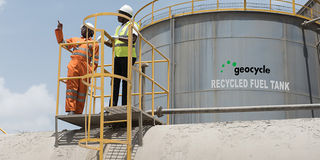Sustainable waste management solutions by Bamburi Cement
Sponsored by Bamburi Cement

Waste oil is an environmental hazard that Bamburi helps to eliminate through safe disposal.
Bamburi Cement PLC is the leading cement manufacturing company in Eastern Africa. It’s a Kenyan brand with a long history of unwavering commitment to sustainable environmental practices.
Right from its beginning, Bamburi has always invested in sustainable practices like quarry rehabilitation, a process that has produced world-acclaimed environmental showcases like the Bamburi Haller Park and Bamburi Forest Trails in Mombasa, among others.
In the last 10 years, Bamburi Cement has directly contributed to the country’s circular economy by converting waste into energy through its industrial operations – a process referred to as co-processing.
Co-processing is a globally recognised sustainable technology through which waste is used as a source of energy to replace fossil fuels such as coal, petroleum and gas (energy recovery), in energy-intensive industries such as cement, cutting down on greenhouse gas emissions. As a result, 100 percent of the waste input is recycled without leaving any additional residue. The technology also ensures a performing destruction of toxic components. A big part of this process is its contribution to solving the waste management problem.
Through its Geocycle Kenya brand, which handles its waste management operations, Bamburi Cement has become an important player in providing sustainable solutions to the waste problem in Kenya. The company has partnered with different organisations to dispose of their waste at its cement kilns through this environmentally friendly process. These include waste oil, agricultural waste, waste tyres, condemned cargo, and others. Partnering with oil marketers through a Safe Waste Oil Disposal (SWOD) programme with the Petroleum Institute of East Africa (PIEA), Bamburi supports them to safely dispose of their waste oil. Safe disposal of waste oil is important in curbing the proliferation of adulterated oil in the market, as well as averting the environmental damage the oil would otherwise cause.

Tyres ready for disposal.
Other waste disposal partnerships are with logistics companies to dispose of their waste tyres (which globally, are among the largest and most problematic sources of waste), and agricultural producers and millers to dispose of wastes such as rice husks. We also help in the destruction of condemned cargo, including counterfeit products, and carbon black, among others.
We know that practices like open burning of farm waste, for example, causes severe pollution of air, land and water to local and regional scales.
In the disposal of condemned cargo, Bamburi partners with agencies like the Anti-Counterfeit Authority (ACA), Kenya Bureau of Standards (KEBS), and the National Environment Management Authority (NEMA).
“Over 20,000 tons of waste is co-processed by Bamburi Cement every year. A total of over 250,000 tons of waste that could have otherwise ended up in the environment or landfills has successfully been converted into energy in the last 10 years within our industrial operations in Mombasa and Nairobi. We remain committed to a ‘Zero Waste Future’ and continued contribution to a circular economy,” says Jane Wangari, Ag Geocycle and New Projects Director at Bamburi Cement.

Jane Wangari, Ag Geocycle and New Projects Director at Bamburi Cement.
Bamburi’s target is to continue increasing its capacity to handle waste and convert it into energy year-on-year. Waste incineration is done in compliance with NEMA requirements.
Bamburi, through its Geocycle Kenya waste management arm, is licensed by NEMA to carry out waste disposal in the country. The process is done in compliance with not only the NEMA requirements, but also in line with global standards, given that Geocycle (which is owned by Bamburi’s mother company Holcim) operates globally. Partners are also issued with a Certificate of Destruction to certify that the waste disposal was done according to environmental laws.
“Nothing goes to landfill, which is very important for organisations working towards a Zero Waste Future,” adds Ms Wangari.
Circular economy does not end there. The ripple effects include job creation. “As an example, Bamburi has contributed to over 200 direct and indirect employment opportunities in its operations to collect rice husks in Mwea and disposal at our Nairobi Grinding Plant. These include drivers, collectors, and suppliers contracted to deliver the rice husks safely to our cement kilns,” says Ms Wangari.
Co-processing also supports the sustainability agenda on CO2 emissions control for Bamburi Cement. “We thank our partners for being part of our journey for a Zero Waste Future,” concludes Ms Wangari.


